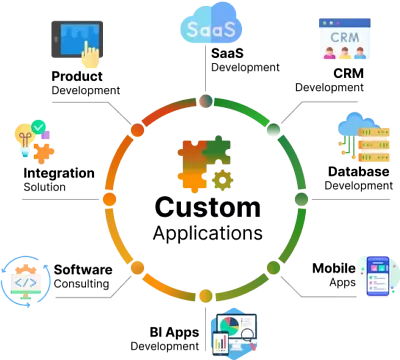Custom Software Development Solutions vs. Off-the-Shelf Solutions: Making the Right Choice

In today’s fast-paced business landscape, companies are constantly looking for ways to improve efficiency, enhance customer experience, and stay competitive. One key decision that businesses face is whether to invest in custom software development solutions or rely on off-the-shelf software. While both options have their advantages and limitations, understanding the differences and aligning them with your business needs is essential for long-term success. This article will explore the key differences, benefits, and drawbacks of custom and off-the-shelf software solutions to help you make the right choice.
What Are Custom Software Development Solutions?
Custom software development involves designing, developing, and maintaining software specifically tailored to meet the unique requirements of a business. Unlike pre-built software, which serves a wide range of users, custom software is created with a specific business’s processes, goals, and infrastructure in mind.
Key Features of Custom Software Development Solutions:
- Designed to meet specific business needs
- Scalable and flexible
- Integrates with existing systems and workflows
- Enhanced security and data protection
- Offers competitive advantage through unique features
Examples of Custom Software Solutions:
- CRM (Customer Relationship Management) tailored to specific customer segments
- E-commerce platforms with unique payment gateways and customer interfaces
- Inventory management systems customized for supply chain requirements
What Are Off-the-Shelf Software Solutions?
Off-the-shelf software refers to pre-built applications designed to meet general business needs. These solutions are mass-produced and widely available, offering a range of features that cater to various industries and business models.
Key Features of Off-the-Shelf Software Solutions:
- Ready to use immediately after installation
- Lower initial cost compared to custom software
- Regular updates and support from the vendor
- Broad functionality for general business needs
- Minimal customization options
Examples of Off-the-Shelf Software:
- Microsoft Office Suite for productivity tools
- Salesforce for customer relationship management
- QuickBooks for accounting and financial management
Custom Software vs. Off-the-Shelf Solutions: Key Differences
| Feature | Custom Software Development | Off-the-Shelf Software |
|---|---|---|
| Cost | High initial investment; long-term ROI | Lower initial cost; ongoing subscription fees |
| Implementation Time | Longer development cycle | Immediate use after installation |
| Flexibility | Highly adaptable to business needs | Limited customization options |
| Scalability | Easily scalable as business grows | May require upgrades or new licenses |
| Security | Enhanced security with custom measures | Standard security features shared with other users |
| Support & Maintenance | Ongoing support tailored to the business | Vendor-dependent support with fixed terms |
Advantages of Custom Software Development Solutions
1. Tailored to Business Needs
Custom software is designed to align with your business goals and internal processes. This allows companies to automate unique workflows and integrate specific features that off-the-shelf solutions cannot offer.
2. Competitive Advantage
Since custom software is unique to your business, it creates a competitive edge by offering proprietary functionality that competitors using generic software may not have.
3. Scalability and Flexibility
Custom software can grow with your business. As your needs evolve, developers can modify and expand the software to accommodate changes without relying on third-party updates.
4. Enhanced Security
Custom software allows for the implementation of advanced security protocols tailored to your business’s specific data protection requirements, reducing vulnerability to cyber threats.
5. Integration with Existing Systems
Custom software can be seamlessly integrated with your existing platforms and infrastructure, improving overall efficiency and reducing operational friction.
Advantages of Custom Software Development Solutions in Different Industries
Custom software development offers tailored solutions that cater to the unique needs of various industries. Unlike off-the-shelf software, custom solutions are designed with specific workflows, compliance requirements, and operational challenges in mind. Here’s how different industries benefit:
1. Healthcare: Enhanced Patient Care and Data Security
Custom healthcare applications streamline operations such as appointment scheduling, patient record management, telemedicine, and billing. These solutions also ensure HIPAA compliance and data encryption to protect sensitive health information.
2. Finance: Better Risk Management and Automation
In the financial sector, custom software enables secure online transactions, fraud detection systems, and personalized banking experiences. It also supports compliance with industry standards like PCI-DSS and facilitates real-time analytics for better decision-making.
3. Retail and E-Commerce: Personalized Customer Experiences
Custom solutions help retailers manage inventory, optimize the supply chain, and create personalized shopping experiences. Integration with CRM and loyalty systems increases customer retention and streamlines backend operations.
4. Education: Interactive Learning Platforms
Educational institutions use custom software for virtual classrooms, course management, student tracking, and communication tools. These systems enhance student engagement and simplify administrative processes.
5. Manufacturing: Streamlined Production and Inventory Control
Custom manufacturing software supports MRP (Material Requirements Planning), production scheduling, inventory tracking, and quality assurance. It integrates seamlessly with ERP systems to improve efficiency and reduce waste.
6. Logistics and Transportation: Real-Time Tracking and Route Optimization
Custom logistics software provides features like fleet tracking, delivery route optimization, load planning, and driver communication. This leads to faster delivery times and reduced fuel costs.
7. Real Estate: Simplified Property Management
Property developers and real estate firms benefit from tailored solutions for listing management, tenant communication, maintenance scheduling, and financial reporting—all in one platform.
8. Hospitality: Better Guest Experiences and Operations
Custom hotel management systems handle booking, check-in/check-out processes, housekeeping, and guest preferences. These tools enhance service quality and improve customer satisfaction.
9. Legal: Improved Case Management and Compliance
Law firms use custom software for secure document storage, deadline tracking, client communications, and billing. These solutions ensure data privacy and efficient case handling.
10. Construction: Real-Time Project Monitoring
Custom applications help manage budgets, timelines, contractor assignments, and on-site safety measures. Cloud-based dashboards offer real-time project updates, improving accountability and resource allocation.
Conclusion
Custom software development empowers businesses across industries by aligning technology with specific operational goals. From improving productivity to ensuring compliance and delivering better user experiences, tailored solutions offer a strategic edge in today’s competitive landscape.
Advantages of Off-the-Shelf Solutions
1. Lower Initial Cost
Off-the-shelf software has a lower upfront cost, making it more accessible to small businesses and startups with limited budgets.
2. Immediate Availability
Since off-the-shelf solutions are pre-built, they can be deployed immediately, allowing businesses to benefit from their functionality without delay.
3. Regular Updates and Support
Software vendors regularly update and maintain off-the-shelf solutions to fix bugs and improve performance, ensuring continuous improvement without additional costs.
4. Proven Reliability
Off-the-shelf software is tested by a wide range of users, which reduces the risk of encountering major technical issues.
5. Wide Range of Features
Pre-built solutions often come with a variety of features that cater to general business needs, providing versatility for different industries.
Advantages of Off-the-Shelf Solutions in Different Industries
Off-the-shelf software solutions are pre-built applications developed to address a wide array of business needs. These solutions are ideal for companies that want cost-effective, quick-to-deploy systems with minimal customization. Below are the key advantages of using off-the-shelf software in various industries:
Healthcare
Fast Implementation and Compliance Support
Healthcare providers can quickly adopt off-the-shelf systems for electronic health records (EHR), billing, and scheduling. Many are built to be HIPAA-compliant, easing the burden of regulation management.
Finance
Pre-Built Security Features and Reporting Tools
Financial institutions benefit from ready-made software that includes encryption, compliance checks, and audit trails. These features support secure and efficient transaction management.
Retail and E-Commerce
Rapid Deployment of Sales Platforms
Retailers can launch online stores quickly using platforms like Shopify and Magento. These tools come with integrated payment gateways, product management, and marketing automation.
Education
Learning Management Systems (LMS)
Educational institutions utilize tools like Moodle and Blackboard, which support online classes, student assessments, and resource sharing—without needing custom code.
Manufacturing
Standard ERP Systems for Operations
Manufacturers adopt ERP systems like SAP or Oracle NetSuite to handle inventory, supply chain management, and production workflows through pre-designed modules.
Logistics and Transportation
Pre-Configured Tracking Solutions
Logistics companies rely on fleet tracking and delivery software with GPS, route optimization, and real-time reporting—all available off-the-shelf to reduce lead times.
Real Estate
Property Management Software
Platforms like Buildium and AppFolio help real estate firms handle leases, maintenance requests, payments, and tenant communication effectively.
Hospitality
Turnkey Reservation and CRM Systems
Hotels and resorts use systems like Cloudbeds or RoomRaccoon to streamline reservations, guest communications, and on-site payments with minimal setup.
Legal
Document Management and Billing Software
Law firms benefit from off-the-shelf tools that offer case tracking, billing templates, client records, and time tracking—all optimized for legal workflows.
Construction
Project Management Tools
Solutions like Procore and Buildertrend offer scheduling, budgeting, and team collaboration features—allowing construction managers to focus more on delivery and less on administration.
Cost-Effective, Scalable, and Ready-to-Use
Off-the-shelf software allows industries to save development time and operational costs. While they offer limited customization, their stability, community support, and broad functionality make them a valuable asset for growing businesses.
Limitations of Custom Software
- Higher Initial Investment: Developing custom software requires a significant upfront investment in terms of both time and money.
- Longer Development Time: Custom software can take several months to develop, which may delay business operations.
- Ongoing Maintenance Costs: Businesses need to account for long-term support, updates, and security patches.
Limitations of Off-the-Shelf Software
- Limited Customization: Off-the-shelf solutions may not fully align with unique business processes, leading to inefficiencies.
- Scalability Issues: Pre-built software may struggle to handle growing business needs without expensive upgrades.
- Security Risks: Since off-the-shelf software is used by multiple businesses, it may become a target for cyberattacks.
How to Choose the Right Solution for Your Business
✅ When to Choose Custom Software Development Solutions:
- When your business has unique processes that require tailored solutions
- When scalability and long-term flexibility are critical
- When security and data protection are high priorities
- When existing off-the-shelf solutions don’t meet your specific needs
✅ When to Choose Off-the-Shelf Software Solutions:
- When your business needs a quick and cost-effective solution
- When the software will be used for standard business functions (e.g., accounting, project management)
- When you need immediate access to vendor support and updates
- When budget constraints limit your options
Conclusion
Both custom software development solutions and off-the-shelf software have their place in modern business operations. While off-the-shelf software provides quick and affordable solutions for general business needs, custom software development offers tailored, scalable, and secure solutions designed to meet specific business requirements. The right choice depends on your business goals, budget, and long-term vision. Carefully evaluating your business needs and consulting with software development experts can help you make the best decision.



